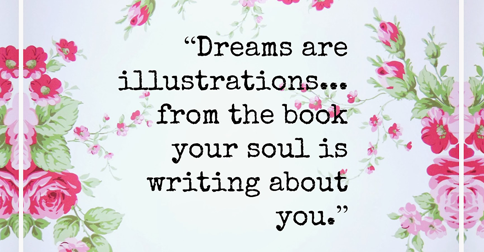HJ: Dreams are a combination of messages and imagery originating in both the subconscious mind and higher realms of existence (astral plane) and therefore are very much worth remembering and learning to interpret, as they have many important insights and meanings for us if we are wise enough to listen, learn and understand. This article by the always venerable Judith Orloff is all about doing just that. Enjoy.
– Truth
How To Remember and Interpret Your Dreams
Learn how to remember and interpret your Dreams.
By Judith Orloff, M.D. | Psychology Today | Judith Orloff
—
Dreaming is a direct line to a place where magic abounds and nothing is without meaning. It is a pristine state of awareness, unpolluted and clear. Direct guidance for healing lies in our dreams, the natural territory of intuition. Here, time and space are non-existent and anything is possible. Like a blank, white canvas, our dream world is a spacious medium where intuition can freely express itself. We have only to listen.
You are in partnership with your dreams. Initiate an ongoing dialogue with them. It’s like consulting the wisest doctor you can imagine who knows you inside out. You can ask your dreams anything. No question is trivial if it is meaningful to you. Expect answers. Some will be direct. Others may require interpretation.
Your dreams can reveal many truths about your life. They can provide extraordinary intuitive insights, and give you information that can help your health, love life and career. You’d be surprised at the straightforward advice that your dreams give, either spontaneously or on request.
Dreams can keep you well. Dreams provide answers. But first you must retrieve them. Here are my four strategies to help you remember your dreams:
Keep a journal and pen by your bed.
- Write a question on a piece of paper before you go to sleep. Formalize your request. Place it on a table beside your bed or under your pillow.
- In the morning do not wake up too fast. Stay under the covers for at least a few minutes remembering your dream. Luxuriate in a peaceful feeling between sleep and waking, what scientists call the hypnagogic state. Those initial moments provide a doorway.
- Open your eyes. Write down your dream immediately; otherwise it will evaporate. You may recall a face, object, color, or scenario, feel an emotion. It doesn’t matter if it makes perfect sense-or if you retrieve a single image or many. Record everything you remember.
When you’re finished, refocus on the question you asked the previous night. See how your dream applies. One, two, or more impressions about the who/what/where of your solution may have surfaced. Get in the habit of recording your dreams regularly. Be assured I’ve never met anyone who can’t be taught how to remember. Keep at it. Remember to practice. Soon it will become second nature to you!
In addition to the practical aspects of remembering dreams, there’s an intuitive level to understanding dreams. Reliable intuitive information stands out in very specific ways. Watch for these clues:
- Statements that simply convey information
- Neutral segments that evoke or convey no emotion
- A detached feeling, like you’re a witness watching a scene
- A voice or person counseling you, as if you’re taking dictation from an outside source
- Conversations with people you never met before who give instructions.
I’ve found that my most dead-on intuitions either come across as compassionate or have no emotion at all. Develop a careful eye as you practice separating the content of your dreams from your reactions to it. Soon you’ll be able to tell the difference between unreliable guidance and truly reliable guidance.
Be aware that your dreams go by different rules than your waking life. Get ready for a mind shift. Physical laws no longer apply. Gravity changes. In dreams you can fly!
Judith Orloff, M.D is author of the new updated bestseller Emotinal Freedom (NOW available in paperback) and SECOND SIGHT, an inspiring and controversial memoir about coming to terms with her intuitive gifts, upon which this article is based. She is assistant clinical professor of Psychiatry at UCLA and an international workshop leader. For more information visit www.drjudithorloff.com













